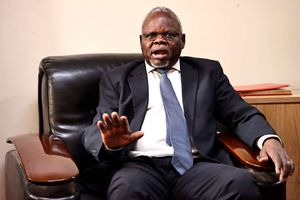Dear KCSE stars, so you want to be a doctor? Read this

Doctor holding a patient hand. PHOTO| Shutterstock
What you need to know:
- We know that despite having 11 medical and two dental schools currently training students and Bachelors level, the country still does not have enough capacity to absorb all those desiring to go into these courses.
- Hence it is only natural that our graduates seek opportunities abroad.
It is that time of the year again! Our high school candidates’ results are out and parents are mighty proud. The media has done the rounds and we know our graduates, thanks to the celebratory moments caught on camera.
First, let me start by congratulating the young people for a splendid job well done. We acknowledge the effort and commitment that has gone into getting you this far. You deserve a round of applause!
Today, allow me to speak to those who have their hearts set on joining the medical and dental profession. This is important for the students and parents of students who will enrol in medical or dental schools across the country and more so for those who wish to train beyond our borders.
Medicine and dentistry are professions where having a degree is only one of the requirements for one to practise their trade. The most important factor is registration by the regulatory authority, which in our case, is the Medical Practitioners and Dentists’ Council. After a doctor has been registered, he/she is then eligible for an annual practice license, to enable them to legally practise within the borders of the republic.
This process is easily lost to many, who do not bother to do due diligence prior to enrolling in the degree course of their choice. As such, after a gruelling six to seven years in training, one finds that the degree with their name on it isn’t worth the paper it is written on!
Let us look at the basic requirement for qualifying for these two Bachelors degree courses. One must attain the minimum score required to enrol in university, which is a C+ (plus) in the case of the KCSE graduates. For those in alternate education systems, the equivalent scores in their A-level examinations are considered. This is because the commission for university education has set this in law as the minimum requirement to study in university for any degree.
In addition, one must have a minimum score of B (plain) in the following four cluster subjects: Biology, Chemistry, either Mathematics or Physics, and either English or Kiswahili. These scores are non-negotiable, they have been enshrined in the law since 2014. All the local universities and all those within the East African Community are fully cognizant of these rules and hence they will not accept the enrolment of any student who does not meet these minimum requirements. Another key rule is that for Medicine, the entire training programme must be no less than six years in training. For dentistry, this duration is not less than five years. All our local schools in East Africa have complied with this rule.
Once the student has successfully completed the degree, they undergo a mandatory one-year internship which is under the auspices of the Ministry of Health and the Medical and Dental Practitioners Council. Successful completion of the internship programme is mandatory for registration.
For one to apply for registration by the Council, they must present their degree certificate, their high school certificate to ascertain the minimum grades were met, and the internship completion certificate, together with the log book.
The real pain is for those who train outside of East Africa, in countries not privy to these rules. This has become the cause of tears for many who failed to heed them. Many have made the mistake of opting to train abroad when they fail to make the cut locally.
These students will complete an entire degree, which is regarded as ineligible if they did not meet the minimum requirements for the degree enrolment in the first place. For those who meet the standards, they are then subjected to a local evaluation through a comprehensive examination to ensure the quality of training is acceptable locally. Once the graduate passes this exam, they are allowed to proceed with the internship and complete the registration process.
We know that despite having 11 medical and two dental schools currently training students and Bachelors level, the country still does not have enough capacity to absorb all those desiring to go into these courses. Hence it is only natural that our graduates seek opportunities abroad.
A friendly word of advice for all those who take the option of training abroad: Make sure you meet the above-stated grades. If you do not do so, then train abroad with the aim of remaining there and working there once you graduate. This means that as you select your school, ensure it is in a country that is open to hiring foreign doctors with ease.
Secondly, do not just grab any scholarship that is offered. Do your research, consult those who have trained ahead of you and ensure the school sets a solid foundation for you as a doctor, not just looking to give you a piece of paper after six years. Please do not train in a school or a country where you have zero or no exposure and contact to actual patients. Medicine and dentistry are practical courses, models and manikins cannot replace the real thing, even in training.
Lastly, ensure that the course must meet the five- or six-year minimum duration and the university is at least listed in the World Directory of Medical Schools. Otherwise your degree isn’t valid, not just in Kenya but even to the rest of the world.
Bottom line, if a country can allow its medical schools to train you but refuse to employ you, ask yourself why they don’t think you are good enough for their population!
Dr Bosire is an obstetrician/gynaecologist





